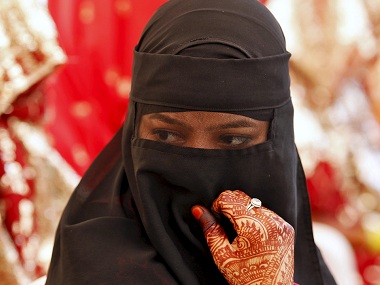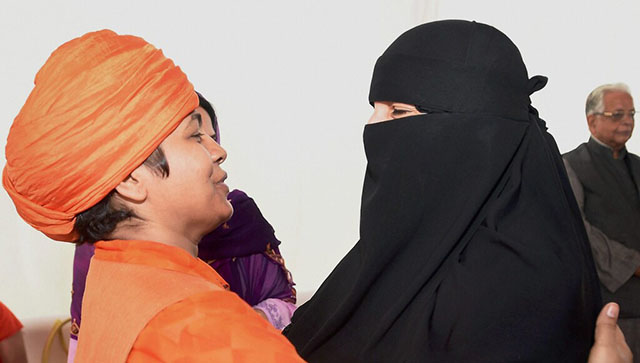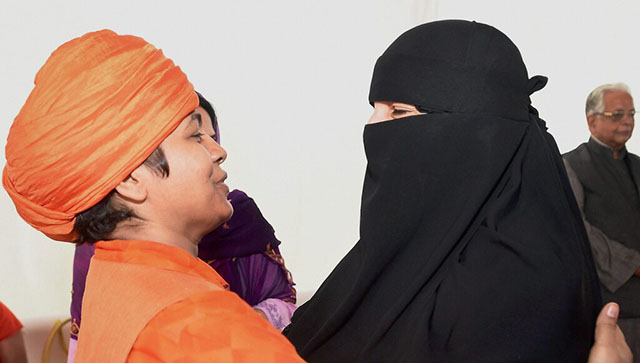The Allahabad High Court on Thursday called triple talaq or the practice of Muslim men getting an instant divorce by saying the word ’talaq’ three times as ‘unconstitutional’. The high court said that ’no personal law board is above the Constitution’, in effect reiterating the Centre’s stand in the Supreme Court recently.
But according to Flavia Agnes, a prominent legal scholar and the director of the Majlis Legal Centre, the judgment, though a boost to Muslim women’s rights, is hardly ‘historic’ as it simply echoes previously held views on the matter. In an interview with Firstpost, Agnes reflects on the ‘hype’ around Thursday’s judgment and narrows down on the finer details of the triple talaq debate.
The Allahabad High Court’s judgment is being seen as a major step towards safeguarding Muslim women’s rights. What are your views on it?
I do not understand why such a big hype is being created around the judgment in the media. The Supreme Court, in the Shamim Ara case of 2002, had already established the practice of triple talaq as unconstitutional and had set a proper procedure for pronouncing the talaq. Since then, many high courts have endorsed the same view. The matter is already sub-judice in the Supreme Court, and in that sense, the high court’s judgment is not historic by any means.
But, at the same time, because of the current hype around the issue of triple talaq and the Uniform Civil Code, any judgment on the issue is bound to picked up by the media, which in turn will help spread awareness among Muslim women about their legal rights. In that sense, it can serve as a positive step.
You said that the judgment reiterates previously held views. Why then, according to you, was the view echoed by the Allahabad High Court especially since it is not legally binding as a precedent?
If you consider recent developments abroad, with Angela Merkel proposing a burqa ban in Germany and France banning the hijab, you can perceive that there is a rise in Islamophobia globally. As a result, a false perception is being spread that everything Islamic and the Islamic culture, the Muslim law in particular, is anti-women.
In India, judgments questioning triple talaq have been passed since 1981 – the Guwahati High Court and the Bombay High Court have repeatedly questioned the Muslim divorce procedure. Then finally, the 2002 Shamim Ara judgment upheld the high court judgments. But back then, no hype was created around the judgment.
What is the reason behind this hype?
Now, any criticism of Muslim law is being highlighted, which is clearly a propaganda by the right-wing government. Anything to do with Muslim women becomes news now and is blown out of proportion.
Clearly, there is a political context to this judgment and that is the reason behind the hype around it. The judgment on its own is proper, but the bashing of the Muslim community as a whole is upsetting. This is absolute propaganda being driven by some people, which directly feeds into the right-wing government’s agenda.
Since the issue of triple talaq is limited to Muslim women, what other approaches can be adopted to prevent the bashing of the community as a whole?
Women’s right to maintenance and shelter are governed by the Domestic Violence Act of 2005, which is a common law for everybody, regardless of their religion. We need to question why Muslim women are not using the laws meant to protect them. Instead of making the issue communal, we should identify the problems being faced by all women and should focus on making the safeguards more accessible.
And it is not as if Hindu women do not face any problems. They face dowry harassment, they are killed for dowry, they are victims of domestic violence, they are victims of desertion, and face many issues that are similar to the ones faced by all women, regardless of religion. We need to understand that even if a Muslim man invokes triple talaq, the woman’s rights are not extinguished; she is still protected under the Domestic Violence Act. We need to stop criticising the religious practices of a particular religion and should focus on safeguarding the rights of all women instead. The problems are not religion-based, they are based on the social conditions prevalent in the country.
You talked about the social conditions prevalent in the country that dictate such practices. Can you elaborate on that?
The social set up that we live in defines the practices that exist here. For example, a Muslim woman living in Saudi Arabia will not face the problem of dowry harassment. She will be in a much stronger position to stipulate the terms and conditions of the marriage to which a Muslim woman is entitled, like Mahr (a mandatory payment, in the form of money or possessions paid to the bride at the time of marriage, that legally becomes her property). Whereas in India, the husband determines the dowry amount, how much money should be spent on the wedding, and how much money the girl’s parents should spend, which is non-Islamic. This practice is inherently Indian and originates from the Hindu-culture. Therefore, we need to identify these conditions as all women need to be protected from discrimination.
So what, according to you, needs to be done to curb this issue?
We need to take a broader approach when it comes to safeguarding women. We need to recognise the strength that is offered by the secular laws which are applicable to Muslim women, to Hindu women and to all other religions as well. We cannot continue to categorise Muslim women as the only ones that are suffering.
Organisations like the Bharatiya Muslim Mahila Andolan (BMMA) are instrumental in portraying a false situation where only Muslim women are suffering. It’s not true that only Muslim women face problems with their religious practices or laws. When you don’t use existing law, when you deliberately do ignore Constitutional safeguards like the Domestic Violence Act and then you make it out like only a Muslim problem.
Organisations like the BMMA are propaganda-based and only highlight the plight of Muslim women, thus reinforcing the Islamophobia prevalent globally and the anti-Muslim sentiments in the country. This perfectly fits into the right-wing communal agenda.
More than any other reform, we need to ensure that women’s civic rights are protected and that safeguards like the Domestic Violence Act are implemented properly.


)




)
)
)
)
)
)
)
)